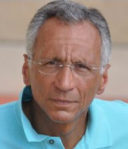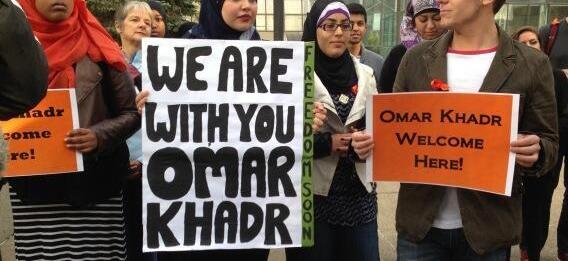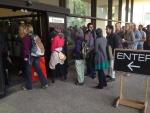Tag Archives: facts
Today Omar’s security classification changed to medium
Free Omar Khadr Now Committee, December 13, 2020
Omar Khadr’s security classification has been changed from maximum to medium. Omar was transferred from Guantanamo to Canada in September 2012 and placed in a maximum security jail. This placement was harshly criticized by The Office of the Correctional Investigator (OCI). “The OCI has not found any evidence that Mr. Khadr’s behavior while incarcerated has been problematic and that he could not be safely managed at a lower security level. I recommend that Mr. Khadr’s security classification be reassessed taking into account all available information and the actual level of risk posed by the offender, bearing in mind his sole offence was committed when he was a minor.”
Omar Khadr was classified as minimum security in Guantanamo. The OCI further noted that “According to a psychological report on file, Omar Khadr interacted well with others and did not present with violent or extremist attitudes”.
Many Canadians are pleased that the new classification will allow Omar to access programs, and services. However, it doesn’t alleviate the fact that Omar’s imprisonment is an abuse of human rights and the rule of law.
Dennis Edney, Omar’s lawyer said “My position is similar to that of the Ombudsman’s office he should be classified as minimum and released.”
.
Related:
Edmonton Journal: Khadr reclassified, likely to be transferred to Bowden
Ombudsman scolds officials for branding Omar Khadr a maximum security inmate
.
Lecture Nov 12 | Attorney Samuel Morison, US Department of Defence
The last in the series of three lectures in Edmonton about Omar Khadr.
With: Attorney Samuel Morison, US Department of Defence
When: Tuesday, November 12, 19:00
Where: The Atrium at King’s University College, 9125 – 50 Street, Edmonton
Samuel Morison has practiced law for more than 20 years and is a national recognized expert on federal executive clemency and the restoration of civil rights. He will speak about Omar Khadr’s appeal before the US Federal Court.
[+] the poster of the lectures
[+] the video of the second lecture, by Brigadier General (ret) Dr. Stephen Xenakis
Court Decision on whether Omar can move to a provincial prison
Herewith the decision of the Court of Queen’s Bench of Alberta. The nightmare for Omar Khadr continues. He has to stay, day in day out, in solitary confinement in a maximum security prison because the judge has decided this is the correct place for a child who has survived the horrors of Guantanamo.
Edmonton Events, Do not miss them
With: Mr. Dennis Edney, Q.C., Omar Khadr’s defense counsel.
When: Thursday, October 17, 2020, 19:00
Where: Room 231/237 U of A Law Centre, Edmonton
CLAIHR U of A is pleased to host a presentation by Mr. Dennis Edney, Q.C., Omar Khadr’s defense counsel. Mr. Edney has agreed to speak to Faculty of Law students concerning Omar Khadr’s highly publicized case. There will be an opportunity for questions following the presentation.
.
With: Brigadier General (ret) Dr. Stephen Xenakis
When: Tuesday, October 22, 2020, 19:00
Where: University of Alberta Building ETLC Rm-1001, Edmonton
Although Mr. Harper and the Canadian government have chosen to demonize Omar Khadr, there are significant faces from the U.S Military and Canadian public who have actually met and spent time with Mr. Khadr and find that he is a compassionate human being who poses no threat to anyone.
Brigadier General (ret) Dr. Stephen Xenakis is a psychiatrist who has spent hundreds of hours with Omar Khadr over the past 5 years. Come out and join the discussion about his experiences with Omar in Guantanamo Bay and raise your own questions and concerns. Refreshments will be provided.
.
With: Attorney Samuel Morison, US Department of Defence
When: Tuesday, November 12, 19:00
Where: The Atrium at King’s University College, 9125 - 50 Street, Edmonton
Samuel Morison has practiced law for more than 20 years and is a national recognized expert on federal executive clemency and the restoration of civil rights. He will speak about Omar Khadr’s appeal before the US Federal Court.
Last Weeks Edmonton Court Articles on Omar Khadr
- Omar Khadr in Court: Eight ways the mainstream media missed the real story by Kathleen Copps (Rabble);
- Omar Khadr: War criminal, Child soldier …. or neither? [en français] by Heather Marsh (VICE);
- Omar Khadr’s lawyer decries government interference by Sheila Pratt (Edmonton Journal);
- Omar Khadr smiles at supporters in Edmonton court (CBC);
- Omar Khadr appears in Edmonton courtroom (CBC-player, 2.59 min.).
- Dennis Edney, Omar’s lawyer, before court
- 120 supporters filled the main court room, overflow was needed
Hope You Are Okay, Omar Khadr
By Ayesha Nasir, Karachi, Pakistan
I have something in common with Omar Khadr. We are both fans of “The Hunger Games” – the best-selling trilogy by Suzanne Collins. One of the most obvious differences between us is that I have not spent ten years of my youth in Guantanamo Bay, Cuba.
As a 15-year-old, Omar Khadr was captured by the US Armed Forces in Afghanistan, when he was wounded twice in the back in a fire fight, which broke out in July, 2002. It was alleged that the teenager had killed a US Special Forces soldier during the fire fight. He had been in an Afghan compound, where he was a translator for his father’s acquaintance. From eastern Afghanistan, Omar was taken to Bagram in a critical condition; he had sustained wounds, which lead to “three holes in his body” and “shrapnel in his face”.
The native-born Canadian remained in the US custody for ten long years, during which his family and activists all over the world pressured the Canadian government to “bring him home”. Heather Marsh, a journalist vocally supporting Omar Khadr’s release, pointed out how “it is legal for US soldiers to kill children”, whereas “it is a war crime for children to kill US soldiers”, raising a valid concern about the double standards, which led to Omar Khadr being alleged with a war crime in the first place.
Omar Khadr’s imprisonment was handed out despite compelling evidence, which stated otherwise, while the United States and Canada ignored the United Nations Convention on the Rights of the Child on the Involvement of Children in Armed Conflict (to which they are signatories) and went ahead with his imprisonment. It was eight years later, in 2010, that the Canadian Supreme Court acknowledged the blatant abuse of Omar’s rights as a human and as a Canadian; the interrogation, which the Canadian Security and Intelligence Service (CSIS) made the “detained youth suspect” undergo was regarded as “a clear violation of Canada’s international human rights obligations” by the Canadian Supreme Court, who is known for its apparent impartiality and execution of justice.
At the time, Audrey Macklin, a professor in the Faculty of Law at the University of Toronto, wondered if the verdict of the Supreme Court of Canada on (a) that the government has violated Khadr’s Charter rights”, and (b) that Canada “should seek repatriation”, was “not enough to motivate this government to act” then there was no saying as to “what is enough to motivate this government to do the right thing”.
“I cried several times during the interrogation as a result of this treatment and pain. During this interrogation, the more I answered the questions and the more I gave him the answers he wanted, the less pain was inflicted on me. I figured out right away that I would simply tell them whatever I thought they wanted to hear, in order to keep them from causing me such pain” – from Omar’s affidavit statement on February 22, 2008.
Testimonies from other prisoners, such as Moazzam Begg, give detailed reports on the treatment he was made to undergo; David Hicks, an Australian prisoner, declared that he “saw US soldiers dragging Omar from his cage to a room used for interrogation just opposite from mine. For at least an hour, I heard him scream and yell in pain as they abused him. Omar was yelling, ‘Why are you doing this? … Please stop. … Somebody help me!’ There seemed to be no point to this brutality except to hurt him and break his will.”
It appears that living in the black hole for human rights did not break Omar’s spirit, for he was sent home to Canada on September 30, 2012, where, as of now, he remains incarcerated in a maximum security prison. Andy Worthington, a journalist, who has been following Omar Khadr’s case closely, admits that the Canadian government could keep him in custody for roughly half a decade more; an outcome of a plea deal made in October, 2010. Despite how reports on his case acknowledge his good behaviour during his ten-year imprisonment, parole remains nowhere near until at least 2015. After having spent considerable time with him, two of Omar Khadr’s US military lawyers describe him as “an intelligent young man” who possesses a “love of learning”.
This “love of learning” has been explored by Arlette Zinck, a professor of English at King’s University College in Edmonton, who took up the task of designing and delivering a study plan for Omar Khadr, while he was detained at Guantanamo Bay. The coursework assigned to him was something he pursued eagerly, a clear sign of a young mind being freshly exposed to a world of literature. As a teenager myself, I do not find it surprising, when interaction with Professor Zinck revealed that Omar identifies most to the character of Primrose Everdeen in “The Hunger Games” trilogy, regarding her as the “moral centre” of the story. Through correspondence via letters and classes held inside prison, Zinck notes a “remarkable” thing about her unique student that regardless of his “exceptionally difficult circumstances”, he manages to find “a way to stay positive and hopeful when many grown men would not.” This is depicted in the “impressive” levels of “energy and determination he puts into his studies”.
Unpopular belief will see Omar Khadr as a political pawn in history by those, who wanted to justify and escape from their criminal actions. There are people, who view Omar Khadr as a radicalized terrorist; despite him having served more than his sentence under an unfair trial, they refuse to allow him to walk as a free man. The boy who will “forever be a murderer” for many is now a young man of 26, whom they do not want to walk as a free man, pursue his education, put his past behind him or even reunite with his family. Being a child soldier, who has been consistently deprived of the most basic of his rights, has put Omar Khadr in a unique position in history, the likes of which were seen somewhere around the second World War.
True rehabilitation, however, is a psychological experience, which will require efforts on the part of Omar, his family, supporters and legal team – the wounds left by the US military penal system will take time to heal. Rehabilitation is part of Corrections Canada’s philosophy and the attempt by the Professor Zinck and Omar’s legal team depicts, how false are the distortions surrounding Omar Khadr. His portrayal in the media is polarized, and, as Pakistanis, who can know better than us about the media’s role in electing the bad guy in the tale. The debate rages on the morality of acts done in the name of love and war, but as we have seen in the case of Omar Khadr, nothing was ever fair.
A decade ago, I was sitting in my school’s library watching “Dumbo” (1941), a Disney classic, and hiding tears over the imprisonment of a baby elephant’s mother, just because she was trying to protect him and appeared a threat while doing so. That is when it struck me: the bad guy in the tale is not always the one everyone points out to be. From this childhood lesson, I have learnt that although the true justice may never be handed out, it is not futile to pursue it. The struggle of the human spirit to resist injustice is a real one; the efforts of conscious individuals, who seek to bring pain to a closure, will echo in the pages of history for those ahead, who will look back and wonder, why there was so much silence for so painful a wound.
“About myself, what can I say? We hold on to hope in our hearts and the love from others to us and that keeps us going until we reach our happiness” – Omar Khadr to Arlette Zinck, in a letter dated January 22, 2009.
.
Letter writing campaign against Vic Toew’s denial of a media request, interview Omar Khadr
.
Dear Supporters of Omar Khadr,
In light of recent media coverage of Vic Toew’s denial of a media request for an interview with Omar Khadr, the Vancouver Free Omar Khadr Campaign is encouraging a letter writing campaign to share our criticism of his appalling interference.
[+] Omar Khadr prison interview overruled by Vic Toews’ office (CBCnews)
Please forward or edit the template letter as you see fit. It would be very helpful if you sent copies to Stephen Harper and your M.P. Address/Contact information is provided below.
Thank you for your support!
Vancouver FREE Omar Khadr NOW Committee
.
___________________________________
Date___________________
Vic Toews
Minister of Public Safety
Suite 306
Justice Building
House of Commons
Ottawa, Canada
K1A 0A6
Dear Mr. Toews:
I am writing to protest the political interference of the office of the Minister of Public Safety in an application for a prison interview with Omar Khadr. Your decision to overrule the warden’s approval is considered to be highly unusual and outside the bounds of your authority. Only recently you reassured Canadians that decisions related to the future of Omar Khadr would be determined by Correctional Services Canada independent of government involvement. Political interference in the judicial process threatens the foundations of our democracy, Mr. Toews. I therefore urge you to:
1. allow the warden’s decision to take precedence and allow media access to Omar Khadr.
2. end the complicity of Canadian government officials in the ongoing violation of Omar Khadr’s human rights that are protected by international law and the Canadian Charter of Rights and Freedoms.
Sincerely,
.
Name_______________
Addess______________
.
________________________________
TAKE ACTION:
1. Phone Vic Toews:
1-613-992-3128, toll free: 1-800-944-4875
2. Send an email message:
[email protected]
3. Send a letter: (no stamp needed). Hard copy letters have the greatest impact. Please write to:
Vic Toews
Minister of Public Safety
Suite 306, Justice Building
House of Commons
Ottawa, Ont.
K1A 0A6
4. Tweet Toews:
Vic Toews @ToewsVic
5. Send a copy to your M.P.
addresses listed here:
http://www.parl.gc.ca/Parlinfo/Compilations/HouseOfCommons.aspx?Menu=HoC
6. Send a copy to Stephen Harper:
[email protected]
7. Call Stephen Harper:
1-613-992-4211
8. Send a copy to Mulcair:
[email protected]
9. Send a copy to Trudeau:
[email protected]
10. Send a copy to May:
[email protected]
.
Canadian Omar Khadr to appeal terrorism convictions
By Paul Koring, The Globe and Mail Apr. 27 2013
Omar Khadr’s plea-bargained guilty plea and conviction on murder, terrorism and spying charges will be appealed to a U.S. civilian federal court that has tossed out similar Guantanamo military tribunal convictions for two high-profile al-Qaeda defendants.
If the appeal succeeds, Mr. Khadr could be freed immediately.
His lawyers expect the U.S. Court of Appeals for the District of Columbia Circuit to overturn Mr. Khadr’s conviction – just as it did in the cases of two of Osama bin Laden’s close personal aides, Ali Hamza Bahlul and Salim Hamdan, both also convicted at Guantanamo.
That would create consternation in Ottawa, where ministers have called Mr. Khadr a terrorist and successive Liberal and Conservative governments refused to extricate him from Guantanamo despite his Canadian citizenship and his hotly debated status as a child soldier under international law. He pleaded guilty in 2010 to multiple crimes committed in Afghanistan in 2002. As part of that plea, he confessed to throwing a grenade that killed U.S. Sergeant Christopher Speer.
The Pentagon’s Office of the Chief Defense Counsel has named an appellate team of attorneys for Mr. Khadr led by a civilian Sam Morison. Now armed with a formal go-ahead from Mr. Khadr, the team is expected to file the appeal soon.
They’re confident the military tribunal convictions will be overturned. “In our view there are serious questions about the validity of all these convictions,” Mr. Morison said, adding: “As the law now stands, I don’t see how his convictions can be affirmed.”
In rulings on Mr. Hamdan last October and again in January on Mr. al-Bahlul, the civilian appeals court overturned the terrorism convictions against the two. It concluded the military war crimes tribunal created by the George W. Bush administration after the 2001 terrorist attack that levelled New York’s twin towers and left the Pentagon ablaze had tried and convicted detainees on crimes that didn’t exist when the defendants were captured. President Barack Obama has opted to retain the military commissions and keep Guantanamo running, despite his pre-2008 election vow to close the infamous prison complex.
Mr. Khadr’s case is additionally complicated because, unlike Mr. Hamdan or Mr. al-Bahlul, he pleaded guilty at his week-long trial in October, 2010, that included a remorseful statement to Sgt. Speer’s widow. As part of that deal, Mr. Khadr waived his right to appeal.
Mr. Khadr admitted to murder in violation of the law of war, attempted murder in violation of the law of war, conspiracy and providing material support for terrorism and spying.
But if the underlying acts weren’t crimes – at least not war crimes – then the waiver may also be unreliable and the appeal could still be accepted by the U.S. federal court.
“Not only weren’t they war crimes at the time of their commission but, I would argue,” Mr. Morison said, “that none of them are crimes today, not in international law.”
The exception is spying, which was so broadly redefined in the Military Commissions Act, it bears little resemblance to espionage as defined in international law.
It could be months before the appeal is formally launched, let alone heard.
In the meantime, Mr. Khadr, who has been held prisoner since 2002, will be eligible under Canadian law for a parole hearing in July this year, when he will have served one-third of the eight-year sentence he agreed to at his 2010 trial.
Mr. Khadr, near death, was dug out of the rubble of an Afghan compound bombed by U.S. warplanes in June, 2002, where the then-15-year-old son of a major al-Qaeda figure was living with a group of militants building and planting roadside bombs.
Even if Mr. Khadr threw the grenade that killed Sgt. Speer, killing a combatant on a battlefield isn’t a war crime except in narrowly defined cases. Those include shooting a defenseless descending parachutist, a wounded soldier or one indicating surrender.
.
Source: http://www.theglobeandmail.com/news/national/canadian-omar-khadr-to-appeal-terrorism-convictions/article11587422/?cmpid=rss1
.
MORE RELATED TO THIS STORY
- Faulty info in feds’ Omar Khadr file suggests he killed two Afghans
- Validity of Khadr’s guilty plea in doubt
- U.S. court ruling casts shadow on Omar Khadr’s war crimes convictions
Omar Khadr or: How Canada Rejects the Very Principles of the Rule of Law and the Further Erosion of Our Values.
Omar Khadr’s lawyer Dennis Edney’s Talk | Vancouver April 16, 2020





